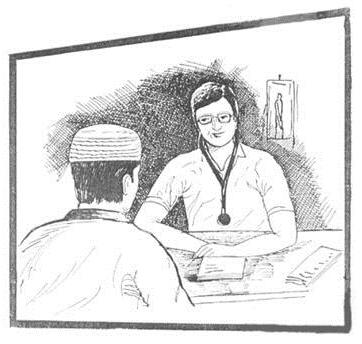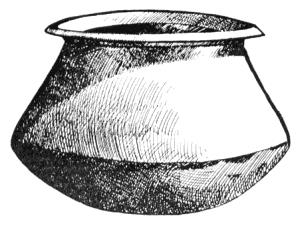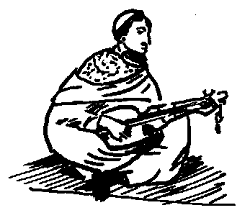Lesson Twenty-One
Dialogue twenty-one: What happened yesterday?
L: paróon tsu wakht raapáatsede? What time did you get up yesterday? | پرُون څۀ وخت راپاڅېدې؟ |
H: shpug báje Six o'clock. | شپږ بجې. |
L: byaa de tsu ookRul? Then what did you do? | بيا دې څۀ وکړل؟ |
H: byaa me pu brush baande gaakhóona safáa kRul. Then I brushed my teeth. | بيا مې په برش باندې غاښونه صفا کړل. |
L: paróon de chărta DoDúy óokhoRula? Where did you eat food yesterday? | پرُون دې چرته ډوډۍ وخوړله؟ |
H: pu kor ke me óokhoRula. I ate at home. | په کور کښې مې وخوړله. |
L: paroon dăftur ta láaRe? Did you go to the office yesterday? | پرُون دفتر ته لاړې؟ |
H: aw, tur yuwe báje póre me kaar óokRo. Yes, I worked until one o'clock yesterday. | آو، تر يوې بجې پورې مې کار وکړو. |
L: maakháam de tsu ookRul? What did you do in the evening? | ماښام دې څۀ وکړل؟ |
H: maakháam me sabzée wáakhista aw kor ta ráaghlum. In the evening I bought some vegetables and I came home. | ماښام مې سبزى واخسته او کور ته راغلم. |
L: begáa de khabróona waawredul? Did you listen to the news last night? | بېګا دې خبرُونه واؤرېدل؟ |
H: na, waa-me-nu-wredul. No, I didn't listen to it. | نه، وامې نۀ ورېدل. |
L: begáa tsu wakht oodú shwe? What time did you go to sleep last night? | بېګا څۀ وخت اُودۀ شوې؟ |
H: yólus báje Eleven o'clock. | يوولس بجې. |
NOTE:
Look carefully through the dialogue and identify which verbs are transitive and which are intransitive. See if the verb endings make sense to you.
Pronunciation practice
Focus on the ت - t and ټ - T sounds in this tongue twister:
Compound transitive verbs in the simple past tense
There two kinds of compounds that use two different کول - kawul verbs:
Stative compounds use کول - kawúl (to make ____ ____ ) to talk about changing an object or making it something -- ie. make the shirt (object) ironed. In the simple past tense these verbs use the perfective root کړل - kRul.
Dynamic compounds use کول - kawúl (to do ____ ) to talk about doing an action -- ie. to do work. The action or object of the sentence is a noun inside the compound. In the simple past tense these verbs use the perfective root وکړل - óokRul.
Simple past endings of کول - kawúl (to make) - using perfective root کړل - kRul
The simple past is formed from the perfective root کړل - kRul just as with any other verb is formed, but in spoken Pashto the ړ - R is often left out for an even shorter form.
| Person | Short | Medium | Full |
|---|---|---|---|
1st pers. s. | kum کم | kRum کړم | kRulum کړلم |
2nd pers. s. | ke کې | kRe کړې | kRule کړلې |
3rd pers. m.s. | ko کو | kRo کړو | kRulo کړلو |
3rd pers. f.s. | ka که | kRa کړه | kRula کړله |
1st pers. pl. | koo کو | kRoo کړو | kRuloo کړلو |
2nd pers. pl. | key کئ | kRey کړئ | kRuley کړلئ |
3rd pers. m.pl. | kRul کړل | kRul کړل | kRul کړل |
3rd pers f.pl. | ke کې | kRe کړې | kRule کړلې |
Stative compounds with کول - kawul (to make) in the simple past
| mistrée staa gáaDay Teek kRo aw ku na? | Did the mechanic fix your car or not (lit. yes or no)? (m.s.) | مسترى ستا ګاډے ټيک کړو او کۀ نه؟ |
| na, Teek ye nu kRo. | No, he did not fix it. | نه، ټيک يې نۀ کړو. |
| ahmád ganée pre kRul? | Did Ahmad cut the sugar cane? (m.pl.) | احمد ګنى پرې کړل؟ |
| aw, maat ye kRul. | Yes, he cut it. (lit. he broke it) | آو، مات يې کړل. |
| khaansaamá ghwakha pakhá kRa? | Did the cook cook the meat? (f.s.) | خانسامه غوښه پخه کړه؟ |
| na, pakhá ya nú-kRa. | No, he didn't cook it. | نه، پخه يې نۀ کړه. |
| pakhwaanúy tsaplúy de zaRé kRe? | Did you wear out your old sandals? (f.pl.) | پخوانۍ څپلۍ دې زړې کړې؟ |
| aw, zaRé me kRe. | Yes, I wore them out. | آو، زړې مې کړې. |
| paróskaal de mewé hum khártse kRe? | Did you also sell fruit last year? (f.pl.) | پروسکال دې مېوې هم خرڅې کړې؟ |
| aw, mewé me hum khártse kRe. | Yes, I also sold fruit. | آو، مېوې مې هم خرڅې کړې. |
| haghé d gharmé DoDúy dupáara tsu tayáar kRul. | What did she prepare for lunch? (m.pl.) | هغې د غرمې ډوډۍ د پاره څۀ تيار کړل؟ |
| wrejze aw qorma ye tayáara kRa. | She prepared rice and a meat sauce. (f.s.) | ورېژې او قورمه يې تياره کړه. |
NOTES:
The last sentence has several potential objects for the verb to agree with. Usually the verb agrees with the last object named (in this case قورمه - qormá. Some sentences will group all the objects together to make the verb plural (in this case تیار کړل - tayáar kRul may be used).
- قورمه - qormá is a meat sauce prepared with chikpeas چڼه - chaNá and either served with rice or eaten with روټۍ - roTúy.
Simple past endings of کول - kawúl (to do) (with prefective root وکړل - óokRul)
| Person | Short | Medium | Full |
|---|---|---|---|
3rd pers. m.s. | óoko وکو | óokRo وکړو | óokRulo وکړلو |
3rd pers. f.s. | óoka وکه | óokRa وکړه | óokRula وکړله |
3rd pers. m.pl. | óokRul وکړل | óokRul وکړل | óokRul وکړل |
3rd pers f.pl. | óoke وکې | óokRe وکړې | óokRule وکړلې |
With these ones the object will only ever be third person, because the object is always a noun/action that is done.
Dynamic compounds with کول - kawul (to do) in the simple past
| dălta ye kaar dăr-sara óokRo? | Did he work here with you? (m.s.) | دلته يې کار درسره وکړو؟ |
| na, kaar ye raa-sara oo-nu-kRo. | No, he didn't work with me. | نه، کار يې راسره ونۀ کړو. |
| parosakaal de tsu kaaroona óokRul? | What jobs did you do last year? (m.pl.) | پروسکال دې څۀ کارُونه وکړل؟ |
| Der kaaróona me óokRul. | I did many jobs. | ډېر کارُونه مې وکړل. |
| taa wăr-sara imdáad oo-nu-kRo? | Didn't you help them? (m.s.) | تا ورسره امداد ونۀ کړو؟ |
| aw, imdáad me wăr-sara óokRo. | Yes, I helped them. | آو، امداد مې ورسره وکړو. |
NOTE:
The masculine singular verb ending وکړو - óokRo is commonly shortened to وکو - óko in ordinary speech.
Practice
You are probably getting the hang of transitive verbs by now.
👆 Try the verbs below to see if you have fluency. Ask your helper to supply words for you to make into sentences. Here is an example of how the drill might work.
| H: haghé / istrée / kamées | هغې / اِستری / قمیص | |
| L: haghé kamées istrée kRo. | She ironed the shirt. (m.s.) | هغې قمیص استری کړو. |
| qameesóona | قميصُونه | |
| L: haghé qameesóona istrée kRul. | She ironed the shirts. (m.pl.) | هغې قميصُونه اِسترى کړل. |
| pardá | پرده | |
| L: haghé pardá istrée kRa. | She ironed the curtain. (f.s.) | هغې پرده اِسترى کړه. |
| pardé | پردې | |
| L: haghé parde istrée kRe. | She ironed the curtains. (f.pl.) | هغې پردې اِسترى کړې. |
Questions and answers
Try to answer each of the following questions, first in the affirmative, then in the negative.
| naséeme daa farsh jaaróo kRo? | Did Nasima sweep this floor? (m.s.) | نسيمې دا فرش جارُو کړو؟ |
| DakTúr halukáan chek kRul? | Did the doctor examine the boys? (m.pl.) | ډاکټر هلکان چېک کړل؟ |
| taa ghwakha pre kRa? | Did you cut the meat? (m.s.) | تا غوښه پرې کړه؟ |
| yo saRay dwuo khuzo sara waadú óokRo? | Did one man marry two wives? (m.s.) | يو سړى دوؤ ښځو سره وادۀ وکړو؟ |
More dynamic compound examples
| taaso rabáab khu óowahulo. | You played the rabab well. (m.s.) | تاسو رباب ښۀ ووهلو. |
| Der kabáan me óoneewul. | I caught a lot of fish. (m.pl.) | ډېر کبان مې ونيول. |
| laambo de wăle oo-nu-wawula. | Why didn't you swim? (f.s.) | لامبو دې ولې ونۀ وهله؟ |
| haghú begáa majlís ookRo? | Did he sing last night? (m.s.) | هغۀ بېګا مجلس وکړو؟ |
| taaso nun munDe óowahule? | Did you run today? (f.pl.) | تاسو نن منډې ووهلې؟ |
| na, munDe mU oo-nu-wahule. | No , we didn't run. | نه، منډې مو ونۀ وهلې. |
| taaso paróon chakar óowahulo? | Did you take an outing yesterday? | تاسو پرُون چکر ووهلو؟ |
| na, paróon mU chakar oo-nu-wahulo. | No, we didn't take an outing yesterday. | نه، پرُون مو چکر ونۀ وهلو. |

Patient: | ګېډه مې خوږېږى. |
Doctor: | ولې؟ |
Patient: | سوې روټۍ مې خوړلې ده. |
Doctor: | اول لاړ شه د سترګو علاج وکړه او بيا د ګېډې. |
Some irregular transitive verbs
Some transitive verbs have no object, and always used the in 3rd pers. masculine plural form. This makes them the easiest past tense transitive verbs to use!
Note that although there’s no object, these are still considered transitive, and the subject still gets inflected with these verbs.
| maa Der óokhaandul. | I laughed a lot. | ما ډېر وخندل. |
| saRó raapóre óokhaandul. | The men laughed at me. | سړو راپورې وخندل. |
| de khúze wăle óojzaRul? | Why did this woman cry? | دې ښځې ولې وژړل؟ |
| haghwée begáa óojzaRul. | They cried last night. | هغوى بېګا وژړل. |
| spo Tóla shpa óoghapul. | The dogs barked all night. | سپو ټوله شپه وغپل. |
| maashoomáano pu ghólee ke óodangul. | The children jumped in the courtyard. | ماشُومانو په غولى کښې ودنګل. |
| moong pu paark ke óozangul. | We swung in the park. | مُونږ په پارک کښې وزنګل. |
| maa pu seend ke óolaambul. | I bathed in the river. | ما په سيند کښې ولامبل. |
In Pukhto laughing is done at someone, and is considered transitive.
Phrases that express time
| bul kaal ba bahár zum. | Next year I am going abroad. | بل کال به بهر ځم. |
| pu raatlóokee kaal ke ba bahár zum. | In the coming year I am going abroad. | په راتلُونکى کال کښې به بهر ځم. |
| pu raatlóonkee myaasht ke ba momúm garm shee. | In the coming month the weather will become warm. | په راتلُونکى مياشت کښې به موسم ګرم شى. |
| du oos na pas ba daa kaar daa shaa kawe. | From now on, do this work like this. | د اوس نه پس به دا کار دا شان کوې. |
| pu raatlóonkee wrazo ke staa de leedó koshis kawúm. | In the coming days I will try to see you. | په راتلُونکى ورځو کښې ستا د ليدو کوشش کوم. |
| pu aayndá ke ba sakht koshís kawúm. | I will try harder in the future. | په آئينده کښې به سخت کوشش کوم. |
| pu de wrazo ke Der khalq wajzulee kegee. | Many people are being killed these days. | په دې ورځو کښې ډېر خلق وژلی کېږى. |
| nun sabáa zu Der masróof yim. | I am very busy these days. | نن صبا زۀ ډېر مصرُوف يم. |
| pu de shpo aw wrazo ke mosúm Der yukh day. | These days and nights the weather is very cold. | په دې شپو او ورځو کښې موسم ډېر يخ دے. |
| pu de wakht ke zu Der stúRay yim. | At this time I am very tired. | په دې وخت کښې زۀ ډېر ستړے يم. |
Common responses to questions
| daa kaar de wăle óokRo? | Why did you do that? | دا کار دې ولې وکړو؟ |
| zuka che zu Der gharéeb yim. | Because I am very poor. | ځکه چې زۀ ډېر غريب يم. |
| halta wăle ze? | Why are you going there? | هلته ولې ځې؟ |
| zuka che zmaa plaar dălta nu raaze. | Because my father is not coming here. | ځکه چې زما پلار دلته نۀ راځى. |
| dălta wăle ráaghle? | Why did you come here? | دلته ولې راغلې؟ |
| zu staa du paara ráaghlum. | I came for you. | زۀ ستا د پاره راغلم. |
| haghá de wăle waa-nu-ghusto. | Why didn't you buy it? | هغه دې ولې وانۀ غستو؟ |
| Der graan wo, pu de wúja me waa-nu-ghisto. (waa-nu-khisto) | It was very expensive, so for this reason I didn't buy it. | ډېر ګران وو، په دې وجه مې وانۀ غستو (وانهٔ خستو). |
| tu islaam aabaad to wăle laa-nu-Re? | Why didn't you go to Islamabad? | تۀ اسلام آباد ته ولې لانۀ ړې؟ |
| zuka che maa sara payse nu we. | Because I didn't have money. | ځکه چې ما سره پیسې نۀ وې. |
| paróon de kaar wăle oo-nu-kRo? | Why didn't you work yesterday? | پرُون دې کار ولې ونۀ کړو؟ |
| zuka che zu naajóRa wum. | Because I was sick. | ځکه چې زۀ ناجوړه وم. |
| wăle wăr-sara khabure nu kawe? | Why are you not speaking with them? | ولې ورسره خبرې نۀ کوې؟ |
| zuka che wăr-na khufa yim. | Because I am upset with them. | ځکه چې ورنه خفه يم. |
| haghá wăle raa-nu-ghlo? | Why didn't he come? | هغه ولې رانۀ غلو؟ |
| zuka che oozgáar nu wo. | Because he was not free. | ځکه چې اوزګار نۀ وو. |

Compehension drill: Housework
| jaaróo wáakhla aw báawachee khaana jaaróo ka! | Take the broom and sweep the kitchen! | جارُو واخله او باورچى خانه جارُو که! |
| dastarkháan aw lóokhee óoweenza! | Wash the table cloth and the dishes! | دسترخوان او لوښى ووينځه! |
| byaa beTúk ta laaR sha, mezoona aw kUrsúy safáa ka. | Then go to the guest room and clean the table and chairs. | بيا بېټک ته لاړ شه، مېزونه او کُرسۍ صفا که. |
| fash jaaróo ka, byaa ye óoweenza! | Sweep the floor, then wash it! | فرش جارُو که، بيا يې ووينځه! |
| du beTúk qaaléen bahár óotsanDa! | Beat the betuk rug outside! | د بېټک قالين بهر وڅنډه! |
| byaa ye waapás ráawRa aw oo-ye-ghwaRawa! | Then bring it back and spread it out! | بيا يې واپس راؤړه او وېې غوړوه! |
| poRúy hum jaaróo ka aw khazúla ye pu Tokrúy ke wáachawa. | Sweep the stairs and put the rubbish in the dustbin. | پوړۍ هم جارُو که او خزله يې په ټوکرۍ کښې واچوه. |
| byaa ráasha aw zaan ta chaay jóRe ka! | Then come and make yourself some tea! | بيا راشه او ځان ته چائې جوړې کړه! |
NOTE:
When the enclitic pronoun یې - ye is used right after the و - oo prefix, the two sounds blend together to make something like a وې - we sound.
Memorising memorizingMoment
matalóona
Tapa
Exercises for Lesson Twenty-One
- Translate the following sentences into Pukhto:
- Change the following into simple past tense.
